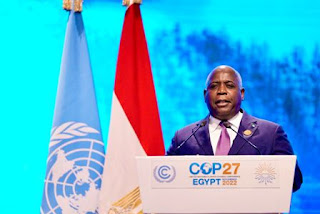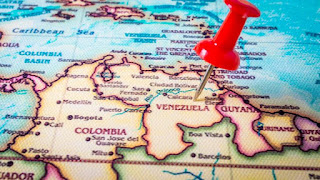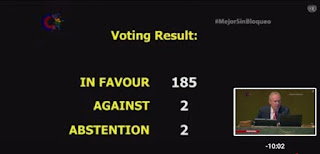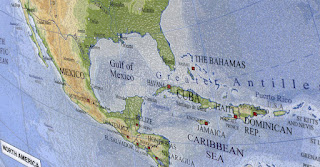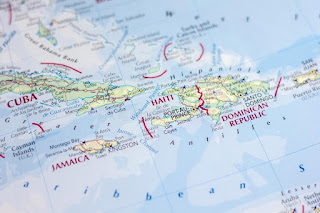Highlighting the crisis facing Haiti
In support of Haiti in its fight to establish peaceful coexistence and democratic governance
The Security Council today established a sanctions regime on Haiti, imposing a targeted arms embargo, travel ban and asset freeze upon individuals and entities designated for such measures, who are responsible for or complicit in actions that threaten the peace, security or stability of the country.Unanimously adopting resolution 2653 (2022), (to be issued as document S/RES/2653), the Council decided to establish a Committee of the Security Council consisting of all the members of the 15-member organ, to undertake, among other tasks, the monitoring of the implementations of travel ban, asset freeze and arms embargo measures imposed upon individuals and entities designated by the Committee; to seek and review information regarding them; and to designate individuals and entities to be subject to the aforementioned measures.
It also requested the Secretary-General to create for an initial period of 13 months, in consultation with the Committee, a group of four experts (“Panel of Experts”) to assist it in carrying out its mandate, and to make the necessary financial and security arrangements to support the work of the Panel.
Further, the Council affirmed that it would keep the situation in Haiti under continuous review and that it shall be prepared to review the appropriateness of the measures contained in the resolution, including the strengthening, modification, suspension or lifting of the measures. It went on to request, in this regard, the Secretary-General, in close coordination with the Panel of Experts, to conduct, no later than 15 September 2023, an assessment of progress achieved.
By other terms, the Council demanded an immediate cessation of violence, criminal activities, and human rights abuses which undermine the peace, stability and security of Haiti and the region, including kidnappings, sexual and gender-based violence, trafficking in persons and the smuggling of migrants, and homicides, extrajudicial killings and recruitment of children by armed groups and criminal networks. It also urged all political actors to constructively engage in meaningful negotiations to overcome the current political stalemate to allow the holding of inclusive, free and fair legislative and presidential elections, as soon as the local security situation permits.
Speaking after the vote, Linda Thomas-Greenfield (United States) said that the adopted text that her country and Mexico put before the Council, constitutes an important step forward to help Haiti’s people. The text is robust and incorporated the views of all Council members despite the accelerated time frame. The adopted resolution is an initial answer to the calls for help from the Haitian people, she continued, noting that it targets the criminal actors, gangs and their financiers who are causing suffering and expanding poverty in the country. It sanctioned one of their most notorious gang leaders, whose actions directly contribute to the humanitarian crisis and cause so much pain and suffering, she said, adding: “It sends a clear message to the bad actors holding Haiti hostage: we won’t stand idly by as you wreak havoc.”
She went on to note that the adopted text fulfils two objectives: it targets bad actors and allows humanitarian aid to reach the civilian population. It is therefore a “great foundation for future action” to be taken against criminal actors and financiers, she said, adding: “There is much more work to do.” Pointing to another immediate challenge, to restore security and alleviate the humanitarian crisis in Haiti, she said that her country and Mexico are working on another text, which pertains to “a non-United Nations international assistance mission”, which will enable the flow of desperately needed humanitarian aid. “We must keep doing everything we can to help the Haitian nation in their time of need,” she stressed.
Juan Ramon de la Fuente Ramirez (Mexico) said the Council’s unanimous adoption of the resolution reflects its unity on a complex situation. Highlighting the crisis facing Haiti, he said the Council has given a clear signal that violence must stop and cannot go unpunished. It is important to establish an embargo on any arms transfer to non-State actors who, in addition to terrorizing the civilian population, are destabilizing the country. Trafficking in arms is a scourge for many countries and must be fought firmly, he added. The resolution sends a clear signal that “the Security Council will not remain with its arms crossed” and will act not only against those creating violence in the streets but against those who support, finance and encourage them. The United States and Mexico, with the text, are trying to support Haiti in its fight to establish peaceful coexistence and democratic governance, he said, calling on Council members to continue to work on subsequent steps needed to achieve that goal.
Geng Shuang (China), noting that while his country had always called for caution against using threats of sanctions irrespective of the circumstances, stressed that considering the urgency of the current situation in Haiti, Beijing has been the first within the Council to propose targeted sanctions on criminal gangs. Expressing hope that the adopted resolution will send a clear signal to criminal gangs in Haiti, he urged them to stop harming the Haitian people and stop chipping away at the country’s economic, social and security foundation. He further called on the political parties in the country to immediately stop their collusion with criminal actors and reach a consensus on the nation’s political structure as well as a transitional arrangement without delay. Underscoring that the country is at the brink of a collapse and is in dire need of international help, he also showed hope that in the next stage of the discussion on this issue, the Council will uphold the spirit of consultation and unity, while adhering to the principle of reaching a result-oriented and a practical solution.
Mona Juul (Norway), noting her country’s vote for the resolution, underscored that the Haiti’s people deserve the international community’s full attention, assistance and dedication. In response, the Council today is establishing its first sanctions regime since 2017 — an important steppingstone for reducing the abilities of criminal actors and gangs to continue their violence and illegal activities which paralyse Haiti. She highlighted the important inclusion of the robust humanitarian carve-out in the sanctions regime, as well as the Council’s recognition of the need for fair and clear procedures and its intent to authorize the Ombudsperson to remedy that issue. Observing due process is instrumental to maintain the efficiency and legitimacy of any sanctions regime, she stressed, noting that Norway has advocated for stronger safeguards of due process for years. It is significant that the Council has now made clear its intent to authorize the Ombudsperson to ensure due process beyond the 1267 regime, she added, stressing that the organ must keep up its intentions and continue its engagement in due process.
Dmitry Polyanskiy (Russian Federation) said that, while his delegation supported the resolution, reaching agreement on the text “was not easy”. However, he noted that its sponsors “changed their initial, not-very-constructive approach”, and addressed Council members’ concerns regarding the resolution’s excessive haste and artificially short deadlines. The consensus achieved shows that, “even in today’s circumstances”, the Council can achieve good results if a responsible approach is taken, he said. Despite that, he said that his country is not convinced that international restrictive measures are the appropriate response to the raft of problems in Haiti. Long-term solutions must be found in the political process, socioeconomic development and national institutions, strengthened without external dictates. He also pointed out that illegal arms flows and organized crime in the Caribbean are not just focused on Port-au-Prince. Restrictive measures should not lead to Haiti’s isolation or prevent it from making progress on the political track, he stressed, adding that such measures are not a punitive instrument; rather, they are a way for the Council to respond to threats. Further, their propriety must be regularly analysed, and they must be mitigated or lifted as necessary.
Fergal Mythen (Ireland) welcomed the adoption, adding that the destructive gangs who are making life a hell for the people of Haiti must no longer go unchecked. Today, for the first time in five years, the Security Council has adopted a new sanctions regime, he noted, welcoming the inclusion of sexual and gender-based violence as a stand-alone designation criterion. Also noting the specific reference to the Ombudsperson in preambular paragraph 20, he looked forward to concrete progress on extending the mandate of the Office of the Ombudsperson to Haiti and all other sanctions regimes. It is vital to ensure that the Organization’s sanctions respect international due process standards, he stressed, calling on the Council to address that concern.
Martin Kimani (Kenya) said his country voted in favour of the resolution after making an effort, alongside Ghana and Gabon, to ensure it incorporates a review mechanism and targets those who compromise Haiti’s peace. Thanking the penholders and others for welcoming his views, he pointed out that the text constitutes the most tangible measures taken by the Council recently. “It is the first step towards building a lasting solution to the Haitian crisis, and [his country] stands with the Haitian people against gangs and their sponsors,” he said.
He went on to welcome the benchmarks for review which will permit the progressive adjustment of measures as the situation on the ground improves. The implementation of sanctions will rely on the support and coordination of the international community, in particular, regional States. He expressed confidence that despite divergent views, Haiti’s political leaders will find the will to build consensus and chart a viable way forward.
Lana Nusseibeh (United Arab Emirates), said her country’s vote in favour of the resolution, as establishing a sanctions regime on armed gangs in Haiti through the resolution is an important step to address the violence and terror imposed by armed gangs on the people of Haiti. The resolution incorporates her country’s proposal for a humanitarian carve-out to minimize the impact of sanction measures on humanitarian assistance to Haiti, she pointed out, noting that the organ’s constructive approach to that critical issue and unanimous adoption of the resolution is a much-needed sign of the possibility of Council unity. She also welcomed the inclusion in the resolution of her country’s proposal to give increased recognition to the important role regional countries and organizations, including the Caribbean Community (CARICOM), to support Haiti in its path to peace and stability. Her delegation looks forward to future discussions to establish clear, well-defined and achievable benchmarks for the eventual lifting of sanctions when the time is right, she said, calling urgently on all stakeholders in the country to work towards an inter-Haitian political settlement.
Ronaldo Costa Filho (Brazil), pointing out that sanctions may lead to unintended consequences, welcomed that a humanitarian carve-out was added in the resolution, allowing humanitarian actors to assist civilians in need. While recognizing the specificity of each sanctions regime, he expressed hope that the carve-out will be replicated to other situations in a horizontal manner. Highlighting the ongoing need to ensure minimum standards of due process in line with international human rights law, he expressed regret that the Council missed the opportunity to address this challenge. Noting that the reference to the Office of the Ombudsperson was incorporated as its preambular paragraph, he hoped to further advance due process both in this regime as well as in others. Underscoring that setting up a new sanctions regime in the Council after five years is a huge responsibility, he emphasized that his country would have welcomed a more transparent and interactive process of negotiations to fully address all outstanding issues.
Carolyn Oppong-Ntiri (Ghana) welcomed efforts by Mexico and the United States to accommodate various delegations’ input and, ultimately, forge consensus on this resolution. Gangs continue to perpetrate kidnappings and sexual violence on, and destroy the lives and livelihoods of, ordinary Haitians, and she expressed hope that the resolution will both address these challenges and signal to criminal actors perpetrating heinous crimes in Haiti that they will be held accountable. The Council owes Haitians a response to the humanitarian and security crises in their country, but this resolution is only one step. She therefore welcomed the text’s benchmarks that will enable the Council to assess the effectiveness and propriety of the measures therein. Such measures also aim to ensure that no adverse humanitarian consequences result from their imposition, which is important given the history of previous, similar measures. She called on neighbouring countries and others in the region to support the Council in implementing the resolution.
Nathalie Broadhurst Estival (France), expressing concern over the situation on ground, welcomed the unanimous adoption of the text that sanctions the inadmissible violent acts of gangs in Haiti. She welcomed the constructive spirit in which discussions were held, and hoped such a spirit will continue onto the process of taking the next steps in mobilization for the country’s peace and security.
Michel Xavier Biang (Gabon), Council President for October, speaking in his national capacity, said that his country voted in favour of the resolution because the text aims to neutralize the gangs that are sowing terror in the country; dry up their financing; protect the civilian population, particularly women and children; and provide the conditions for a response to cholera. He hoped that the text is immediately implemented in letter and spirit, underscoring the Council’s strong message of solidarity with Haiti’s people and its respect for the country’s sovereignty and territorial integrity.
For his part, Antonio Rodrigue (Haiti), in welcoming the unanimous adoption of the resolution, stated that the new restrictive measures, including travel bans and asset freezes, will contribute to bringing an end to the violent and deadly activities of the armed groups in his country. “It demonstrates the desire of the international community to play its role in settling this serious multidimensional crisis and to show the people that Haiti is not alone and its cries for help have been heard,” he added. Pointing out that sanctions alone cannot eradicate the high level of violence ravaging his country, he reiterated that the national police does not have the capacity commensurate with the threat posed by the armed groups, further requesting for robust support in the form of a specialized force. Highlighting that his country is in “a race against time”, he noted that it continues to plunge further into violence and insecurity each day.
Source

